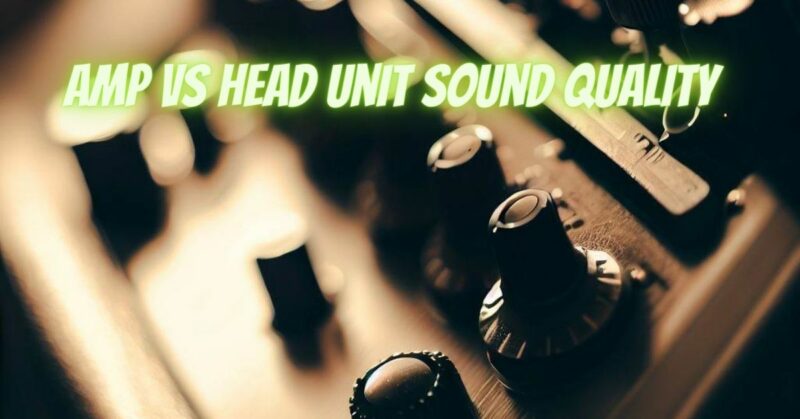When it comes to your guitar rig, sound quality is paramount. Whether you’re performing live, recording in the studio, or simply jamming at home, the choice between an amplifier (amp) and a head unit can significantly impact your tone. In this article, we’ll delve into the nuances of sound quality when comparing amplifiers and head units, helping you make an informed decision based on your musical preferences and requirements.
Amplifiers (Amps) and Sound Quality:
Amplifiers are known for their simplicity and often revered for their warm, rich, and dynamic sound quality. Here are some aspects of sound quality associated with amplifiers:
1. Tube Amps: Tube amplifiers are celebrated for their classic and vintage sound quality. They produce a warm and harmonically rich tone that many guitarists find appealing. Tube amps are known for their natural compression and ability to deliver sweet, organic distortion when pushed to their limits.
2. Solid-State Amps: Solid-state amplifiers offer a clean and transparent sound quality. They reproduce your guitar’s tone faithfully without introducing much coloration. Solid-state amps are favored for genres that require pristine cleans, such as jazz.
3. Hybrid Amps: Hybrid amplifiers combine tube and solid-state technologies to balance the warmth of tubes with the reliability of solid-state components. This combination provides a unique tonal character appreciated by some guitarists.
4. Speaker Interaction: The speaker(s) in an amplifier significantly impact the sound quality. Different speaker types and sizes influence the overall tone, with factors like speaker efficiency, frequency response, and cabinet design playing a role in the sound signature.
Head Units and Sound Quality:
Head units, or amp heads, are prized for their customization and versatility in shaping sound quality. Here’s how they influence sound:
1. Tonal Versatility: Head units offer a higher degree of tonal versatility. They often feature a wide range of tone-shaping controls, allowing you to fine-tune your sound to your exact specifications. This versatility makes head units a popular choice for genres that require diverse tonal options.
2. Modular Configuration: Sound quality with head units can vary depending on the choice of speaker cabinet. By selecting different cabinets, you can significantly alter the sound quality, tailoring it to your preferences.
3. Scalability: If you prioritize sound quality adaptability, head units provide scalability. You can upgrade or change your speaker cabinet independently to suit evolving sound requirements, which can enhance sound quality as your rig grows.
4. Speaker Selection: With head units, you have the freedom to choose high-quality, specialized speaker cabinets that match your desired sound quality. This flexibility allows you to optimize your rig for the best possible sound.
Comparing Sound Quality:
When comparing sound quality between amplifiers and head units, consider the following:
- Amplifiers often have a distinct sound character associated with their technology (tube, solid-state, hybrid).
- Amplifiers are known for their simplicity and ease of use in shaping your sound.
- Head units offer greater versatility and customization but may require more precise tuning to achieve the desired sound quality.
- Head units allow you to tailor sound quality by selecting specific speaker cabinets, making them suitable for those seeking unique tonal characteristics.
The choice between an amplifier and a head unit ultimately depends on your tonal preferences, playing style, and specific needs. Both options offer their own unique sound qualities, and the “better” choice is subjective.
Amplifiers provide a straightforward path to rich and classic tones, while head units offer versatility and customization to sculpt your sound quality. The key is to align your choice with your musical journey, tonal aspirations, and the sound quality you desire to create the best possible sonic experience for your guitar playing.


